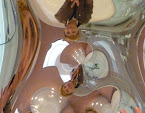In August this year, I gave a poetry reading at a seminar with
post-graduate students and some interested poets at Monash University in Melbourne. In the discussion following the reading John Hawke asked me what I might suggest as a topic or an area that’s been overlooked or neglected, to someone wanting to research Australian poetry. I went into a kind of awkward mental paroxysm because I don’t really trust the kinds of historicisations that have been produced here. With scant exception they’re usually traditional masculinist studies and the few anecdotal biographical books produced by poets are also usually kind of glossed-up male memoir. So I said a few things like that and then made a regrettably unthinking (stupid even?) statement about not being interested in memoir or biography much anyway. Hmmm … not quite true. Although I have been reluctant to historicise my own life-in-poetry on paper, so far.
Recently though, I read a memoir, well, actually the author doesn't like or use the term 'memoir', I read a non-fiction novel,
INFERNO (A POET’S NOVEL), by one of my favourite US contemporaries, the inimical Eileen Myles.

Eileen has written many books of poetry and has also written tons of
art criticism (see Ken Bolton on her recent collection The
Importance of Being Iceland here).
Eileen’s prose is almost always a memoir of some kind - the stories in
Chelsea Girls, a short memoir called On My Way, and a
‘non-fiction novel’ Cool For You. Inferno is about a
working class girl from Boston who has written some high school
poetry, moving to New York City and beginning a life-in-poetry through the social upheavals, drinking, drugs (speed) and sexual experimentation of the 1970s. She is figuring out her own sexuality and her place in the poetry scene and the world at large. She’s interested in things other than a simple history of herself. She connects in her encounters with a whole lot of different people, including, of course, older poets living in NYC. Eileen ran as a candidate for the US Presidency in the 1980s. She was for a time the co-ordinator or director (?) of St Mark’s Poetry Project. In Inferno she goes on a reading tour to Berlin with some punky companions (Kathy Acker et al), unexpectedly spends a year or so writing in a big country house owned by NYC art scene patrons, talks about her dad the alcoholic mailman and her mother the loving yet staunch Catholic. It is written in her usual frank, funny, sad, droll, minimal style - it’s as if Eileen is talking to you, (and to herself and to her dog, Rosie) as you read. She makes some terrific descriptions of her lovers’ labia and clitorises (once she becomes a lesbian). It’s a clever book. Here are some excerpts from Inferno :
I was preparing for my new life. La Vita Nuova, La Vita Nuova I
reported cryptically to my friends at Grassroots. I knew the ball had
fallen so I went to Oscar Wilde and bought some books. I was reading about Renée Vivien who had died for love. She sort of looked like Rose. And she wrote about someone - that I think she was jealous of - maybe Natalie Barney- that she was nothing but a cunt with a pen. This was quoted as an example of Renée Vivien’s deterioration, her slow sink into mental illness but I didn’t see what was wrong with this at all. Is it so bad to talk about a woman and her writing in the same sentence, especially to insult her? Are we supposed to be fake?

Eileen then, photo by Robert Mapplethorpe
And, these are outside a context here, but great anyway -
Poets hated anyone outwardly courting success - particularly
anyone seen courting it in our world - as if there actually were “a
poetry field.”
… No one asked me to have a life like this, to be a poet. It was my
idea. I mean and I would definitely say poetry is a very roundabout
way to unite both work and time. A poet is a person with a very short
attention span who actually decides to study it. To look. To draw that
short thing out… … Like Jimmy Schuyler once said, the writing the poem part is easy, it’s the rest of the time that’s the problem.

Eileen now, photo by Leopoldine Core
When I think about it, I do like 'memoir'. Some kinds of memoir. Take some recent, not so conventional books - Patti Smith’s Just Kids, Tony Towle's MEMOIR, John Kinsella's Genre(a wildly abstracted memoir), Bob Dylan’s mid-60s ‘novel’ Tarantula and Chronicles:Volume One, Prosper Mérimée’s short recollection of Stendhal in Simon Leys’ With Stendhal - I loved all these books. And looking at the bookshelves in-need-of-culling in this room where I stare into space, scribble notes for poems, and have corresponded with zillions of Jacket magazine contributors (some of whom have written northern hemisphere memoirs) and from where I sometimes push tiny ideas out into the ether of the internet, there are biographies, autobiographies and memoir sitting close by - Samuel Beckett, Juan Goytisolo, Mina Loy, Georges Perec, Chester & Wystan, Bernard Smith, Michel Foucault, Harpo Marx, Marjorie Perloff, Arthur Rimbaud, Jim Sharman, Mary Wollstonecraft, Edward Said, Jean Genet, Gwendolyn MacEwen, George Sand, Dorothy Hewett, Frank O'Hara, Wayne King, Tennessee Williams, Eric Michaels, Luis Bunuel, Slim Dusty (Walk A Country Mile) and more …
Maybe I could start my anecdotal narrative on the Enoggera Army Base, Brisbane in 1963, or in Crown Street, Surry Hills, Sydney in my flat above the original Maltese pastizzi booth in 1970, or.. or..
